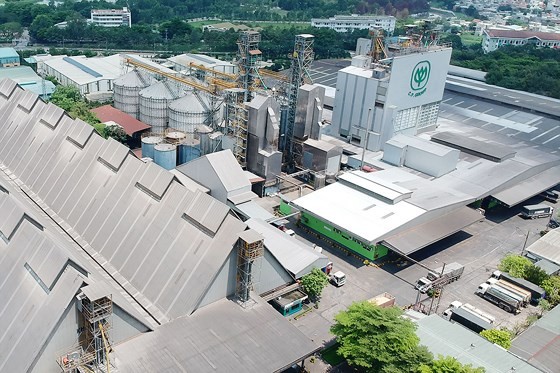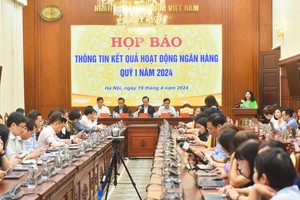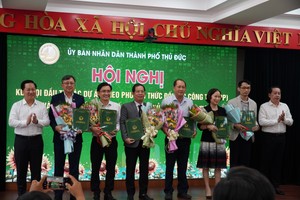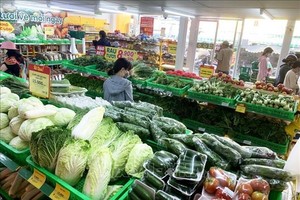
Despite distribution chains’ statistic shows that Vietnamese goods rate accounts for 90 percent in supermarkets’; however, the figure doesn’t match with reality.
Since 1992, Thailand has been one of foreign investors pouring investment capital into Vietnam. The first company was Thailand-invested CP Vietnam Livestock Corporation entering in Vietnam’s market in 1993.
At present, more than 7 percent of pork market share, 16 percent chicken egg market shares, 22 percent industrial chicken market shares and 18 percent animal feed market share are being held by Thailand’s Corporation.
Being a giant industrial estate developer in Asia, Amata Corporation built a 700-hectare Amata Industry Park in the southern province of Dong Na’s Bien Hoa Town in 1994 with investment capital of up to $1.9 billion.
In 2012, Amata continued to expand its investment in the Southeast Asian country with the 1,285 –hectare Amata Express City project in Long Thanh District including 410-hectare hi-tech section and the remaining for urban service, residential quarters and financial hub totally worth $530 million; of which Amata takes over 80.5 percent while Sonadezi Company holds 19.5 percent.
Moreover, Thai industrial estate developer Amata Corporation has also planned a 3,000-hectare urban project, Future City, in the northern province of Quang Ninh.
In 2016, Thai enterprises pledged to pour investment in 468 projects worth $8 billion, standing tenth in countries and territories about the registered capital in Vietnam. In 2017, Thailand rose the project number in Vietnam to 489 with total investment of $9 billion.
Noticeably, though a total $8-9 billion investment capital is not as much as their peers from South Korea, Japan, Hong Kong (China) or Malaysia but not many investors in the world deeply pour capital into Vietnam like Thailand.
Head of Thai Enterprise association Saranya Skontanarak affirmed that Vietnam is considered as major place for Thailand investors.
Taking Metro as an example. Right after Metro Cash & Carry Vietnam had been renamed as MM Mega Market Vietnam, the supermarket has reserved the most eye-catching position for displaying Thai commodities. Even the retailer has been opening a mini fair to sell Thailand-made goods.
According to reports of relevant agencies in Ho Chi Minh City, more and more Thai products are on supermarket and outlet shelves in the city. Currently, stores to sell Thai goods are mushrooming, proving that consumption of such commodities is huge. Moreover, many fashion shops that used to sell Hong Kong or Korean clothes now sell Thai clothes.
Many companies have been set up to import and distribute Thai consumer products. They signed contracts with Thai brand names and distributed to agents in Vietnam. High discount, plenty of promotion, reasonable price and better policies to support transport are attractive conditions for Vietnamese importers.
Furthermore, to support Thai companies to root in Vietnam, Thai relevant agencies have held fairs to display Thai goods for years. Averagely, there are eight fairs annually yet in 2017, three or five-day one or two exhibition fairs were organized monthly. Schedules of these fairs are publicized before they are held.
Vietnamese consumers prefer Thai goods because it is fairly cheap compared to other foreign brand names; accordingly many Vietnamese people wait Thai exhibition fair to buy commodities, instead of making trips to other fairs.
Lately, Thai enterprises have bought all or part of enterprises in different fields; for instance, TCC Holdings Corporation is possessing investments in the fields of retailer shops, beverage and realty in Vietnam worth billions of dollars.
Or, Vietnam Beverage, the local unit which ThaiBev holds a stake in, announced it spent nearly $4.8 billion to buy almost 54 percent holding in Saigon Beer Alcohol Beverage Corp. This is the largest M&A deal not only in Vietnam but also in Asian region.
Economists said that in order to cope with the new situation, Vietnamese government should adopt more policies and prepare spending to lead local enterprises by holding more promotion programs to introduce Vietnamese products in and outside the country.
In the field of retail, the government needs to tighten control over issuance of business license and of scale of residential blocks in a districts between districts, and the distance between retailers. Moreover, the government must review issuance of newly licensed retailers of foreign direct investment (FDI).
In term of handing over land or releasing land to foreign retailers , the government must have detailed regulations to them; for instance , foreign investors must sign contract to operate at least a certain time. Enterprises must pay tax within three years and then it can transfer to other investors; Vietnamese retailers will be on top priority in transactions.
























